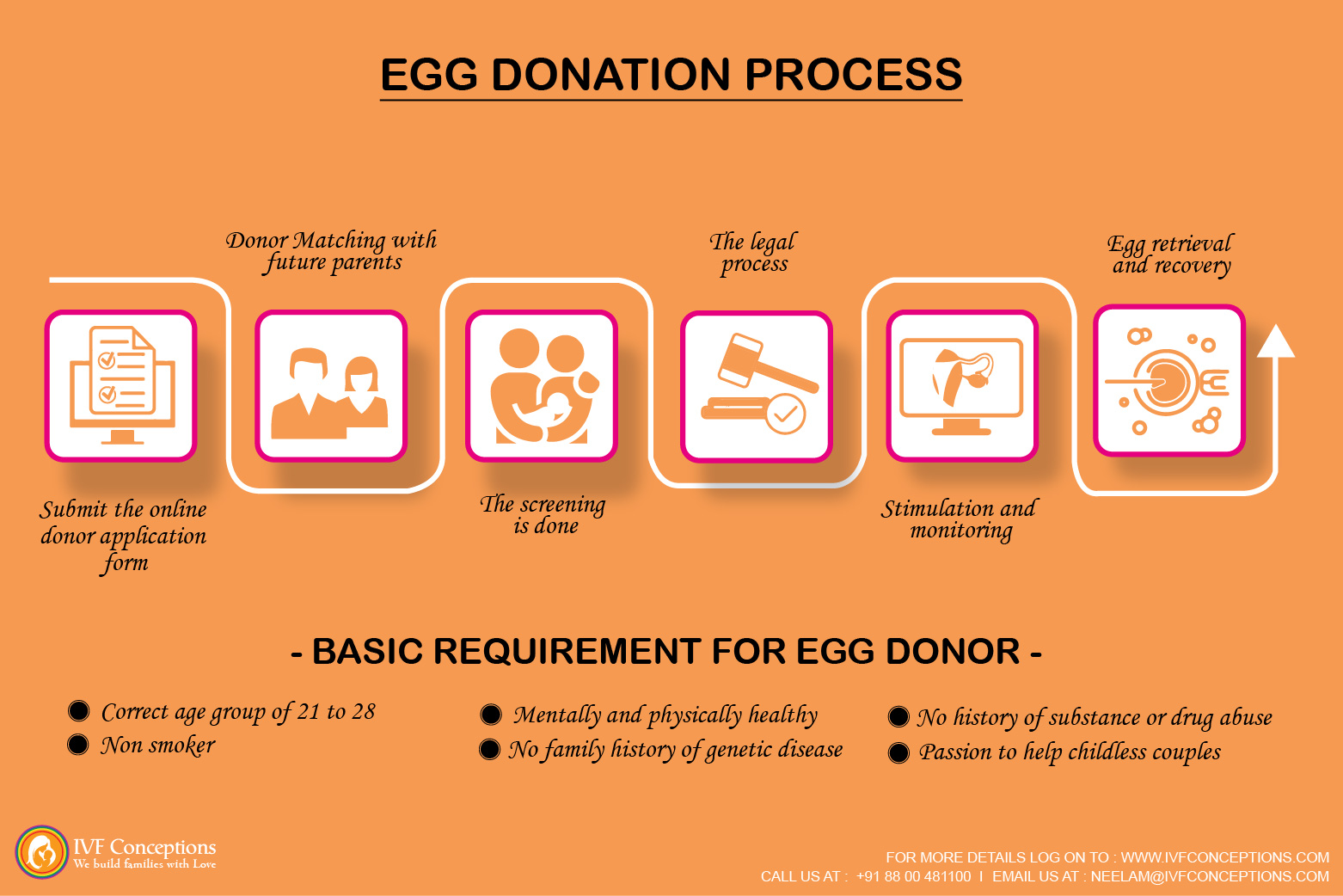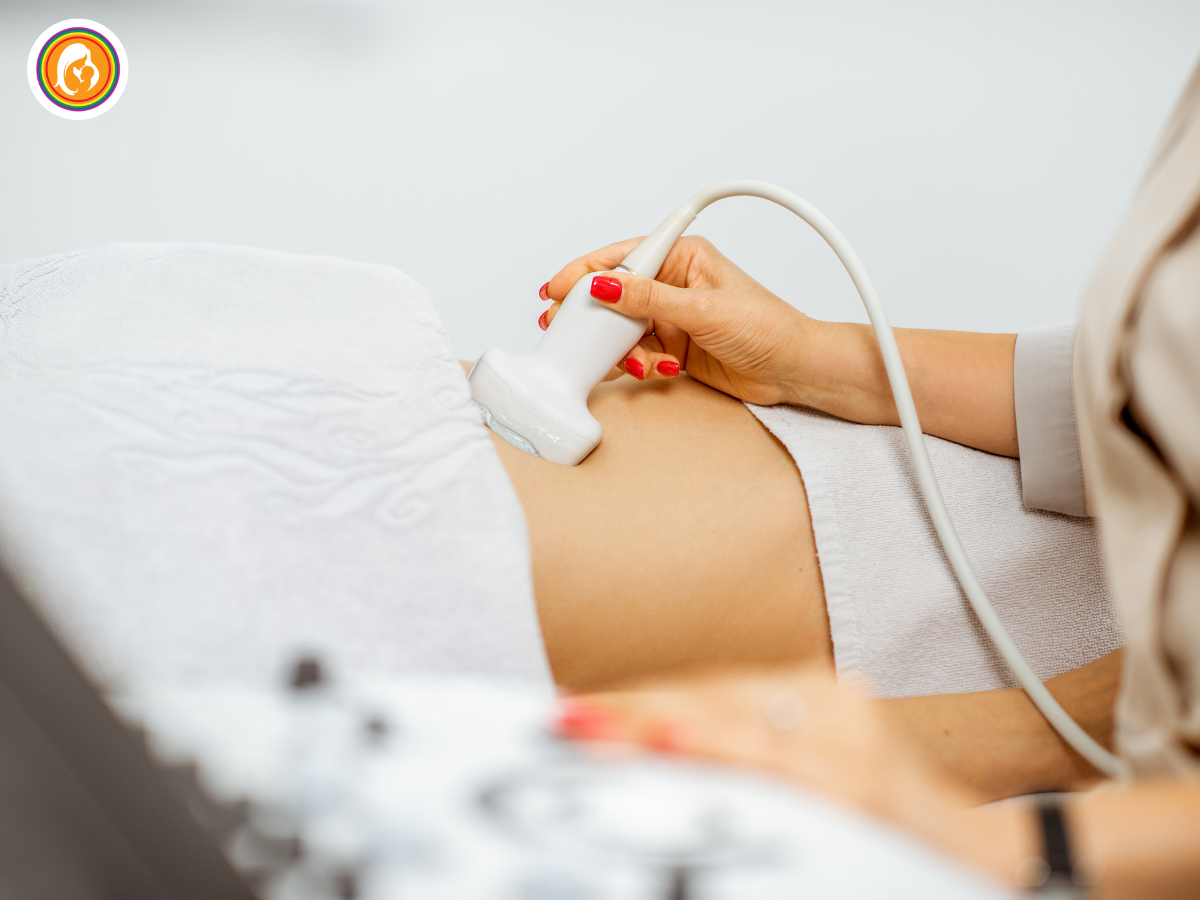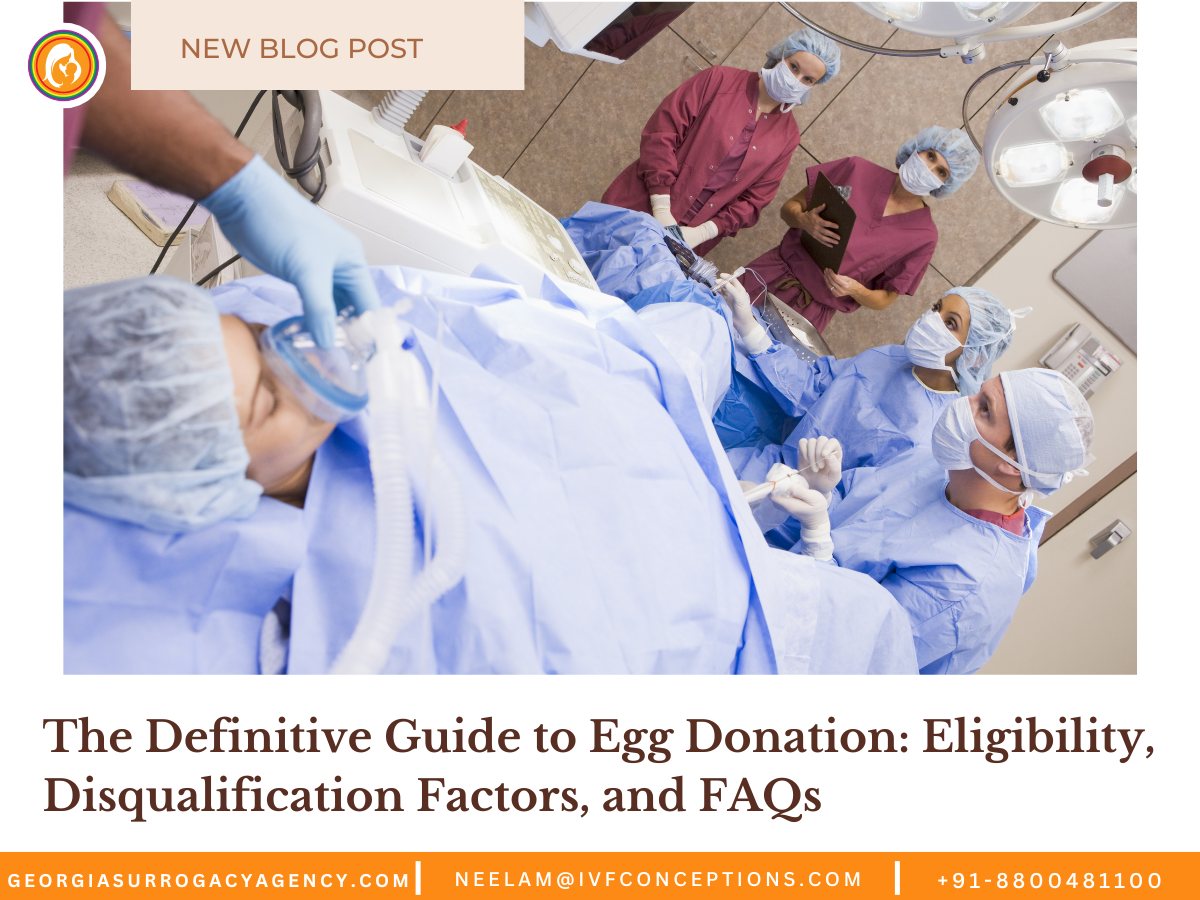The Definitive Guide to Egg Donation: Eligibility, Disqualification Factors, and FAQs
Understanding the qualification criteria for egg donation helps prospective donors prepare and determine their suitability for the process. Meeting these requirements ensures the health and quality of the eggs, contributing to successful fertility treatments for intended parents.
- Book an online appointment: Get a free online consultation.
- Call\W:+91-8800481100 Email:neelam@ivfconceptions.com
Egg donation is a profound act of generosity that enables individuals and couples who struggle with infertility to achieve their dream of parenthood. This guide offers an in-depth look at the egg donation process, including eligibility criteria, common disqualifiers, and answers to frequently asked questions.
Additional Guides for Surrogacy in Georgia
How to find surrogate mother in Argentina
How to find surrogate mother in Georgia
Understanding Egg Donation
Egg donation involves a woman (the donor) providing her eggs to help individuals or couples who cannot conceive with their own eggs. This process can assist heterosexual couples, single parents, and LGBTQ+ couples in realizing their family goals. Donors play a critical role in this journey, contributing significantly to the lives of others.
Eligibility Criteria for Egg Donation
To qualify as an egg donor, you must meet several stringent criteria. These requirements ensure that the eggs are healthy and have the best chance of leading to a successful pregnancy.

1. Age Requirements
- Age Range: Donors must be between 21 and 34 years old. This age range is optimal because eggs from younger women generally have higher quality and better chances of successful fertilization.
2. Health and Medical Criteria
| Criterion | Requirement | Reason |
| BMI | Under 28 | A healthy BMI ensures better fertility outcomes and minimizes complications. |
| Menstrual Cycles | Regular and normal | Regular cycles indicate normal ovarian function and egg health. |
| Overall Health | No significant health issues | Conditions like diabetes or heart disease can affect egg quality. |
| Smoking and Drugs | Non-smokers, no recreational drugs | Tobacco and drugs can adversely affect egg quality. |
3. Lifestyle and Contraception
| Contraceptive Method | Impact on Donation | Notes |
| Hormonal Implants | Can affect menstrual cycle | Discuss with the agency if using implants or other hormonal methods. |
| Birth Control Pills | Can be used with proper timing | Ensure it does not interfere with the egg donation cycle. |
| IUDs | May affect eligibility | Consult with the egg donation agency for compatibility. |
Egg Donation Qualification
Egg donation is a highly regulated process designed to ensure the health and viability of the eggs provided for fertility treatments. Understanding the qualification criteria is essential for prospective donors to navigate the process effectively. Here’s a detailed look at the factors that determine egg donation qualification.

1. Age and Health Requirements
Age Range: Donors must be between 21 and 34 years old. This age range is ideal because eggs from younger women tend to have higher quality and better chances of successful fertilization.
Health Requirements:
- Body Mass Index (BMI): The ideal BMI for egg donors is under 28. A healthy BMI supports overall fertility and reduces risks associated with the donation process.
- Menstrual Cycles: Donors should have regular menstrual cycles. Regular periods indicate normal ovarian function and improve the chances of a successful donation.
- Overall Health: Donors must be in good general health, free from chronic illnesses or conditions that could affect egg quality. This includes being non-smokers and avoiding recreational drugs.
| Health Criteria | Requirement | Rationale |
| BMI | Under 28 | Ensures optimal fertility and minimizes risk. |
| Menstrual Regularity | Regular monthly cycles | Indicates healthy ovarian function. |
| Overall Health | Good general health | Prevents complications and ensures egg quality. |
2. Reproductive Health
Hormonal Health: Donors should not be using hormonal contraceptives, such as implants or injections, that could disrupt their menstrual cycle. If currently using such methods, donors may need to switch to non-hormonal options or wait until their natural cycle resumes.
Reproductive Disorders: Conditions like endometriosis, polycystic ovary syndrome (PCOS), and other reproductive disorders can affect eligibility. A thorough medical evaluation will assess these factors.
| Reproductive Health Factor | Requirement | Impact on Donation |
| Hormonal Contraceptives | Not using hormonal methods | Disruptions can affect egg quality and cycle. |
| Reproductive Disorders | No significant disorders | Ensures healthy eggs and successful donation. |
3. Lifestyle and Behavioral Criteria
Substance Use: Donors must be non-smokers and avoid using recreational drugs. Tobacco and drug use can negatively impact egg quality and overall reproductive health.
Commitment: Donors must be reliable and committed to the donation process, which includes adhering to appointment schedules and following medical instructions.
| Lifestyle Factor | Requirement | Rationale |
| Substance Use | Non-smokers, no drug use | Ensures high-quality eggs and reduces risks. |
| Commitment | Reliable and proactive | Ensures smooth process and successful donation. |
4. Genetic and Family History
Genetic Screening: Donors undergo genetic testing to identify any inherited conditions that could impact the health of the resulting embryos. Known genetic disorders can disqualify a donor.
Family History: A detailed family medical history helps identify any genetic predispositions that might affect egg donation suitability.
| Genetic Factor | Requirement | Impact on Donation |
| Genetic Screening | Required | Identifies potential health risks for embryos. |
| Family History | Detailed medical history | Assesses risk of inherited conditions. |
5. Psychological and Emotional Readiness
Emotional Health: Donors should be in good emotional and psychological health. The donation process can be emotionally demanding, and readiness is essential for a successful experience.
Support System: Having a supportive environment and understanding the implications of egg donation is crucial for donors.
| Emotional Readiness | Requirement | Rationale |
| Emotional Health | Good psychological health | Ensures donor can handle the process effectively. |
| Support System | Supportive environment | Provides stability and understanding. |
Factors That Can Disqualify You from Egg Donation
While many women are eligible to donate eggs, several factors can disqualify potential donors:

1. Irregular Menstrual Cycles
Women with irregular menstrual cycles may face fertility issues that could affect the quality of the eggs. Conditions such as endometriosis or PCOS can also impact eligibility.
2. Health Concerns
Overall health is crucial for successful egg donation. Conditions such as diabetes, heart disease, or severe obesity can disqualify you from donating. Additionally, ongoing use of medications that might affect egg quality or fertility can be a factor.
3. Reliability and Commitment
Egg donation requires a high level of commitment. Missed appointments, delays, or a lack of engagement can disqualify a potential donor. The donation process involves precise timing and dedication.
4. Contraception Choices
Certain types of contraception, such as hormonal implants or injectables, may affect eligibility. Donors should consult with the donation agency about their current contraceptive methods and any required adjustments.
5. Genetic Conditions
Donors undergo genetic screening to identify inherited conditions that could affect the health of the resulting embryos. Known genetic disorders can be a disqualifier in the screening process.
Additional Resources to Read:
How to find surrogate mother in USA
Why is Surrogacy in Georgia the Right option for childless couples in the USA or Europe?
Top Countries for Surrogacy: A Comprehensive Guide for Intended Parents
Conclusion
Egg donation is a significant commitment that involves detailed preparation and adherence to specific criteria. Both donors and intended parents need to navigate this process with careful consideration and dedication. Understanding the eligibility requirements and common disqualifiers can help potential donors make informed decisions.
If you’re considering becoming an egg donor or want to learn more about IVF, egg donation, or surrogacy, visit our website. We offer comprehensive information and free consulting services to help you through every step of the process.
If you’d like to learn more about IVF, Egg Donation, or surrogacy services globally, check out the rest of our website at Georgia Surrogacy Agency. We offer legally secure and affordable surrogacy consulting services for FREE.
Get in touch for FREE SURROGACY CONSULTING:
Mobile: +91-8800481100 ( WhatsApp, Line, Viber)
Email: neelam@ivfconceptions.com

Frequently Asked Questions (FAQs)
1. Can You Reapply as an Egg Donor?
Yes, you can reapply if you have previously been approved and completed a successful donation cycle. Each cycle is unique, and your fertility specialist will review your medical history before approving a new donation.
2. Is Contraception Important?
Contraception plays a role in ensuring the safety and effectiveness of the egg donation process. Here’s why:
| Contraceptive Role | Importance |
| Preventing STDs | Reduces the risk of sexually transmitted infections. |
| Managing Fertility | Prevents unplanned pregnancies, especially during the donation process. |
| Cycle Regulation | Ensures menstrual cycles do not interfere with egg quality. |
3. Cost of Using an Egg Donor
The cost of using donor eggs can vary significantly:
| Type of Egg Donation | Estimated Cost | Additional Expenses |
| Fresh Eggs | $20,000 – $25,000 | Includes donor compensation, medical expenses, etc. |
| Frozen Eggs | Generally lower than fresh eggs | Costs include storage and handling fees. |
| Total Costs | $35,000 – $65,000 | Includes multiple IVF cycles, legal fees, travel, etc. |
4. Does Insurance Cover the Cost of an Egg Donor?
In most cases, insurance does not cover the cost of egg donation. Some insurance plans may cover certain aspects of IVF treatment, but coverage for donor eggs is rare. It is advisable to review your insurance policy and consult with a financial advisor to understand your options.

Highly esteemed, authoritative, and trusted professional with a 14-year of experience in international surrogacy. Advocate for Secure, Legal, and Affordable International Surrogacy.
Neelam Chhagani, MA (Counselling Psychology) and Holistic Infertility and Third-Party Reproduction Consultant.
Member of European Fertility Society, Best Surrogacy Blogger of 2020, with 300 dedicated blogs, and top contributor on Quora for Surrogacy.


Add Your Comment